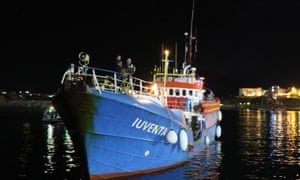Italy Sends Warships into Libyan Waters to Block Refugees

Featured image: Comandante Borsini (Source: Marina Militare)
On August 3, the Italians government sent the frigate Commandante Borsini into Libyan territorial waters to stop refugees fleeing Libya for Europe. This violation of the sovereignty of Libya, a former Italian colony, aims to destroy refugee vessels and force refugees back into Libya, where the militias that have controlled the country ever since the devastating NATO war against Libya in 2011 detain them in appalling conditions.
The Italian parliament has approved a law allowing the Italian navy to trespass into Libyan waters under the pretext that they are helping the Libyan coast guard to arrest refugees. Italian Defense Minister Roberta Pinotti even declared that the goal was to “reinforce Libyan sovereignty.” A large majority in parliament voted for the intervention, 328 to 113 in the lower house and 191 to 47 in the upper house.
The law provoked outrage on Libyan social media and protests in the Libyan capital, Tripoli, with banners bearing pictures of Omar al-Mukhtar, the “Lion of the Desert” who led the resistance to Italian colonial rule in the early 20th century, and the slogan “No to a return to colonialism.” Rome reacted by cutting the number of vessels deployed off Libya from six to two.
Human rights groups denounced the Italian naval operation.
“The Italian Navy deployment in Libyan waters could effectively lead to arbitrary detention of people in abusive conditions,” said Human Rights Watch official Judith Sunderland. “Italy is preparing to help Libyan forces who are known to detain people in conditions that expose them to a real risk of torture, sexual violence, and forced labour.”
The Italian Navy also seized the Iuventa, the ship of the German Jugend Rettet (“Youth Rescue”) NGO, which tries to save refugees on the dangerous central Mediterranean passage from western Libya to Italy. The NGO had refused to sign a “code of conduct” dictated by the European Union (EU) that would have limited the number of refugees it could save on the high seas.
“If NGOs do not sign [the code of conduct], it is hard to see how they can continue their work,” Italian Interior Minister Marco Minniti told La Stampa.
The Italian naval mission points to the rising danger of a new imperialist intervention in Libya by competing European powers. Paris has already called for the installation of camps where French and Libyan officials would imprison, inspect, and render judgment on refugees seeking to escape Libya to Europe. Now, Rome is proposing its own intervention amid escalating rivalries between French and Italian imperialism in North Africa.
The Italian operation provoked a loud condemnation from Field Marshal Khalifa Haftar, a former Libyan general and CIA asset who now controls much of eastern Libya around Benghazi and is being groomed as a proxy for French imperialism.
Haftar’s Libyan National Army (LNA) declared in a communiqué that it would “confront any naval vessel that enters national waters without permission from the army.” It called the Italian operation a “violation of sovereignty” of Libya by Italy; which was aiming to “export the illegal immigration crisis from its territory to Libya’s.” The LNA claimed that its forces in Benghazi, Tobruk, and Ras Lanouf, in the eastern part of Libya, as well as in Tripoli in the west, would confront Italian vessels.

This is only a political maneuver, however, in that the LNA only has forces in eastern Libya, whereas refugees travel along sea lanes going from western Libya to Italy. This is where Rome is sending its warships.
It is plainly evident that Haftar, like the other militia leaders in Libya, is hostile to the anti-imperialist sentiment that is rising among the Libyan workers and masses. He has no fundamental differences from the militias in Misrata and elsewhere in western Libya currently working with Rome. He plans to use the LNA’s control of eastern Libya’s vast petroleum reserves and of the Ras Lanouf refineries to develop ties with other imperialist powers, including France, as well as with the Russian, Algerian, and Egyptian regimes.
These conflicts expose yet again the utterly reactionary character of the 2011 NATO war in Libya. With the assistance of petty-bourgeois academics and political groups like France’s New Anti-capitalist Party, the media and governments shamelessly promoted a war of imperialist plunder, in which NATO coordinated its actions with Islamist and tribal militias, as a “humanitarian” war to defend a democratic revolution. NATO’s overthrow of the Libyan regime only created a disaster for Libya’s inhabitants, as well as for hundreds of thousands of refugees in the country.
Nearly 2,500 refugees have drowned in the Mediterranean in the first seven months of 2017, putting 2017 on track to be the deadliest year yet for refugees trying to cross the Mediterranean. A total of 94,000 refugees traveled from Libya to Italy.
The civil war is also sharpening tensions between the major powers, and in particular among the NATO countries. As Washington threatens Russia and China with war, and rivalries grow between Washington and a Berlin-Paris axis that aims to develop an “independent” defense policy from the United States, a diffuse coalition of countries is backing Haftar.
In January, a military officer from neighboring Algeria spoke to Middle East Eye to underscore growing ties between Moscow, Algiers, and Haftar:
“We will not wait forever for the various Libyan political forces to reach a settlement. Libya needs the law to be applied across its territory and, above all, a strong army that is capable of guaranteeing security all the way to the border. And with the Russians, we see eye to eye.”
According to another Algerian source, Moscow and Beijing both hope Haftar will fight members of the Islamic State (IS) militia that, they fear, could return via Libya to Central Asia or to Xinjiang in China, to carry out attacks there:
“In a certain measure, the Russians also want to secure this area. For they fear that after the defeat of IS in Syria and Iraq, Russian or Chinese terrorists in East Turkestan sympathetic to Jabhat Fatah al-Sham [ex-Al Nusra, the Syrian wing of Al Qaeda], that is 2,000 to 3,000 men, could also flee to Libya.”
After Haftar was invited onto the Russian aircraft carrier Kuznetsov in the Mediterranean in January, the commander of US forces in Africa, General Thomas Waldhauser, said the ties between Moscow and Haftar are “undeniable.” Waldhauser added,
“They are on the ground, they are trying to influence the action, we watch what they do with great concern and you know in addition to the military side of this, we’ve seen some recent activity in business ventures.”
He indicated that Washington planned to continue working with the Tripoli regime.
Paris has oriented to Haftar, however, since the election of President Emmanuel Macron in May, inviting Haftar to a summit in Paris, as Franco-Italian tensions continued to grow on several issues. Not only is Paris refusing to accept refugees who have arrived in Europe via Italy, citing the EU’s Dublin Accords, but Macron has nationalized the STX naval shipyards in Saint Nazaire to block an Italian firm, Fincantieri, from acquiring them.
This provoked an angry comment from the Italian paper Il Fatto Quotidiano on the Berlin-Paris axis in the EU:
“European ideals mask nationalist interests. French President Emmanuel Macron has just decided to nationalize STX, the largest French shipyard, to keep it from falling into Italian hands … In Libya, Macron is playing without Europe and against Italy on petroleum and on immigration: the goal is to take over the petroleum to benefit French [energy] firm Total. France is acting in line with its interests, like Germany.”

